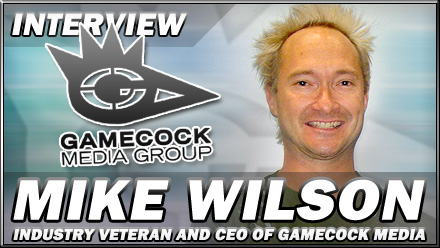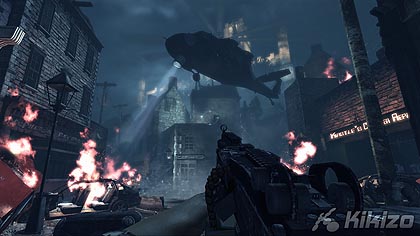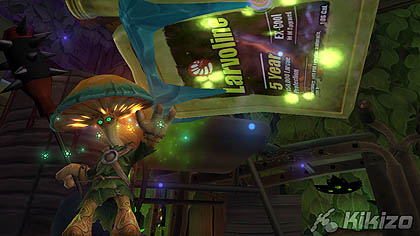Interview: Gamecock CEO Mike Wilson
Industry veteran whose career spans from id Software to Take 2 and most recently Gamecock Media, acquired by Southpeak this week. Join us for a revealing chat about what developers really want, Legendary, and even Max Payne 3.

Page: 1 2
At a recent trade event I padded out my interview schedule with an appointment to see Mike Wilson, CEO of Gamecock - a company whose launch announcement a couple of years ago baffled many. My motive was to get some sort of understanding about a publisher which gamers can't fail to have noticed in at least some small capacity - its name alone is enough to be sure of that, not to mention the well-publicised, er, publicity stunts. Are these guys just having a laugh, or is there a point to all of it?
I went into the interview not particularly convinced about the whole thing, but came away suitably impressed. For one thing, I'd completely underestimated the experience and ability of the Gamecock management. For another, my cynicism towards the actual purpose of the publisher was quite quickly stamped out. It seemed obvious to me that Mike Wilson, the company's front man whose career dates back to Doom and leads to the creation of companies like Gathering of Developers, is not some sort of idiot joker but someone with a sound business head on. More importantly he seemed to be a businessman with a conscience and some admirable, unorthodox ideas. Sure, he curses, he talks openly about industry politics, he's kind of a PR person's nightmare - my kind of exec, then. He's a joker, for sure - but an idiot joker, he is not!
Anyway, it seems I'm not the only one impressed with Gamecock, because this week came the news that they're being acquired by Southpeak Interactive. Southpeak boss Melanie Mroz praised Gamecock's eye-catching roster of upcoming software, and said that the cocky company "supports our strategy of working with independent developers". She said the deal would give the Gamecock titles a "bigger platform to succeed".
We'll resist a "loves the cock" gag. But, with the news of the acquisition, I thought I'd better put my own away and publish this interview, which was obviously conducted before the acquisition announcement, but is still very recent and contains plenty of topical stuff, including some controversial comments on the industry and some of its top players. Most importantly, it should give you a sound overview of exactly what Mike Wilson (and any projects or companies you'll see him involved with) actually stands for, and why it's so relevant to today's games industry. Enjoy.
Kikizo: You guys essentially came out of nowhere, and you've done a lot of rapid deals over the last year - both distribution and developers. You're obviously well funded, you've got a lot of exposure over the last year, and you've got this fresh, confident edgy attitude...
Wilson: Well, we're definitely intending to have fun...
Kikizo: Exactly, you're having a lot of fun, and that's my question: you guys are taking the piss, right down to the name of the company - a cynic might ask if you're the next Gizmondo, because all those things I mention about Gamecock were exactly true of them. If we look at your exec background, it does paint a different picture, but what's the truth here?
Wilson: Well I hope it's not Gizmondo - I don't have anybody's Ferrari right now! [laughs] But, I absolutely know what you mean. And people do get jaded after a while, because of all these great stories - Ion Storm was another one, it seemed like this fantastic thing, and then it just went away. So yeah, people after a while, start to think that the only way to do business is the status quo. And it's certainly an uphill climb to do things differently. But we came back into the industry at a point where I think gamers, press, even the retailers, are really hungry for somebody new and something different. Everyone is complaining about the same things - the stagnation and everything - or at least, they were when we started.
Now, there's all these wonderful things happening, like Nintendo succeeding, you know, proving that it's not all about graphics and technology; Xbox Live, PlayStation Network - all this stuff, that suddenly there's all these new seeds of independence, and small teams being able to... like, these fucking brain games, just comes out of nowhere. And that hasn't been able to happen for like ten years in this industry - you know, it's fantastic. Not that we foresaw all this change, but we came back in when the industry was feeling very, very stale and stuck. But because of the way we're structured, all of these changes are great for us, because we would love to be able to do more of these smaller games, and really be able to take chances on weird and wacky things, that may not all be five or ten million dollar bets. Because those are expensive bets! Anyway, I digress...
Kikizo: It's an interesting approach; you've said how it's relationship driven with the developers, and most notably, that developers you work with get to keep all their IP. Where do you build your value if you don't own any of the IP?
Wilson: We have sequel rights - first rights on sequels. So basically our belief is if the developer wants to do a sequel and we don't, then they should be able to do it elsewhere, if we want a sequel and they don't, we should have to wait until they do! And the most concrete example of this working is Firefly, the guys that are doing Dungeon Hero. And we also put a little ad out to their older game Stronghold Crusader - they recently did Stronghold Crusader Extreme. And the reason this is a great example, these guys own Stronghold because they had a deal with GOD Games [Gathering of Developers], our last company, and they owned their own IP. They got rich, and you know, each one sold a million units. So guess what they do with the next one, they bring it to us and they give it to us for free, because we have a relationship - not because we own them or control that property.
So that was the first concrete example of the relationship coming full circle. And another part of it is, they came to us when we were setting up Gamecock, and they were like, "hey, we did really well, [next] we can do Stronghold 3 - you know, because each one of these games sold over a million units, it's easy money, right? But we also have this original IP we'd really love to do". And we said to them immediately, "well, you clearly want to do the original IP, so let's do it! You can do Stronghold 3 whenever you want." And they were like, "fantastic!" There's no one else in the industry, given those two choices, who would say "I'll take the new game over the sure thing." But the thing is, when they make the sure thing, it's going to be when they want to make it. And you know, there will be a Stronghold 3 at some point, because there are still a lot of fans out there for that game.
Kikizo: And that coming full circle of a relationship, are there going to be other examples of that any time soon or is it a pipedream - was the Firefly thing was a one-off?
Wilson: Yeah, Croteam - the Serious Sam guys - are also working with us on a game; they're another team that did really well with us before.
Kikizo: And this was all dates to the Gathering of Developers era, right?
Wilson: Yeah, and Max Payne would have been the same way, except for Rockstar bought that IP after the fact, so that they could control it. And guess what? Remedy aren't making Max Payne 3 now. I think somebody is.
Kikizo: Do you know who?
Wilson: No, but I hear that it is in development now, under Take 2, so I'm sure just one of the studios that they own.
Kikizo: But under the Rockstar label.
Wilson: Yeah. Rockstar bought that IP basically so that they'd never have to listen to 3D Realms' or Remedy's opinion again - on their own game! [laughs] Which I think is an example of the other side of the model. Like, "I want to buy you, so that I never have to listen to your opinion on something you created." Which, you know, is part of why the franchise took a big beating with Max Payne 2; the guys were under a contract now to finish and ship it that Christmas, no matter what - and they knew they weren't going to do the next one! So you get what you get; it's not quite the same level of passion.
Kikizo: Obviously that is one extreme, and this [Gamecock], is perhaps another, but do you not think that there could be a middle ground?
Wilson: There's really not a concrete need for us to own these guys' property. For us, as long as we own the publishing rights, if it's a hit and the guys want to do a sequel... of course we're gonna fucking do the sequel, you know! [laughs] But it means so much - again Harry and I came from the development side - it means the world to these guys, to be working on something that they own - that they're building their own company's value and benefit for. I'm not saying every game that we've done or will do is great; we'll have some hits and misses.
But I mean, just the fact that knowing that everyone we're working with is working on what they want to be doing, and they feel like that they have a good relationship and they own it - for me, it makes the entire experience of running the company less stressful, and less adversarial.
Kikizo: Well it looks like it's working. But how did you go about getting the funding to make any of this possible in the first place?
Wilson: Knocked on doors for about two years [laughs]. Everywhere. And we basically resolved that it was going to have to be private money, because all the public companies have the same problems that we're trying to be the anecdote to. And it's hard to find... you know, all these games are expensive now, and the marketing's expensive. But we resolved to not do this without enough money again, because we didn't want to end up having to sell the company before we... well you know, we didn't want to sell the company to Take 2 before, but we didn't raise enough money, and they had so many hooks into us that it made it impossible to raise it elsewhere.
So eventually - I call it luck but my partner Harry reminds me that if you're working on it for two years it's not luck! [laughs] - anyway, we found some good... basically angels, with enough money to be able to play at this level. And they happened to want it; they're in media so they're used to it. The big problem with raising money for this industry is the hit-driven nature of it; it's just too risky for venture capitalists. They all think they want in, and then they look in, and they're like, "well what happens if it's not a hit, what do we own?", and you're like, "you own shit!" you know?! [laughs] So you have to get people who are already used to betting on film or television or something else that works that way. These guys had been looking at it for a while, and again, we were lucky that we met them when we did. But so far, so good.
Page: 1 2















 Satoru Iwata Video Interview - the late Nintendo president spoke with Kikizo in 2004 as 'Nintendo Revolution' loomed.
Satoru Iwata Video Interview - the late Nintendo president spoke with Kikizo in 2004 as 'Nintendo Revolution' loomed. Kaz Hirai Video Interview - the first of Kikizo's interviews with the man who went on to become global head of Sony.
Kaz Hirai Video Interview - the first of Kikizo's interviews with the man who went on to become global head of Sony. Ed Fries Video Interview - one of Xbox's founders discusses an epic journey from Excel to Xbox.
Ed Fries Video Interview - one of Xbox's founders discusses an epic journey from Excel to Xbox. Yu Suzuki, the Kikizo Interview - we spend time with one of gaming's most revered creators.
Yu Suzuki, the Kikizo Interview - we spend time with one of gaming's most revered creators. Tetris - The Making of an Icon: Alexey Pajitnov and Henk Rogers reveal the fascinating story behind Tetris
Tetris - The Making of an Icon: Alexey Pajitnov and Henk Rogers reveal the fascinating story behind Tetris Rare founders, Chris and Tim Stamper - their only interview? Genuinely 'rare' sit down with founders of the legendary studio.
Rare founders, Chris and Tim Stamper - their only interview? Genuinely 'rare' sit down with founders of the legendary studio. The History of First-Person Shooters - a retrospective, from Maze War to Modern Warfare
The History of First-Person Shooters - a retrospective, from Maze War to Modern Warfare